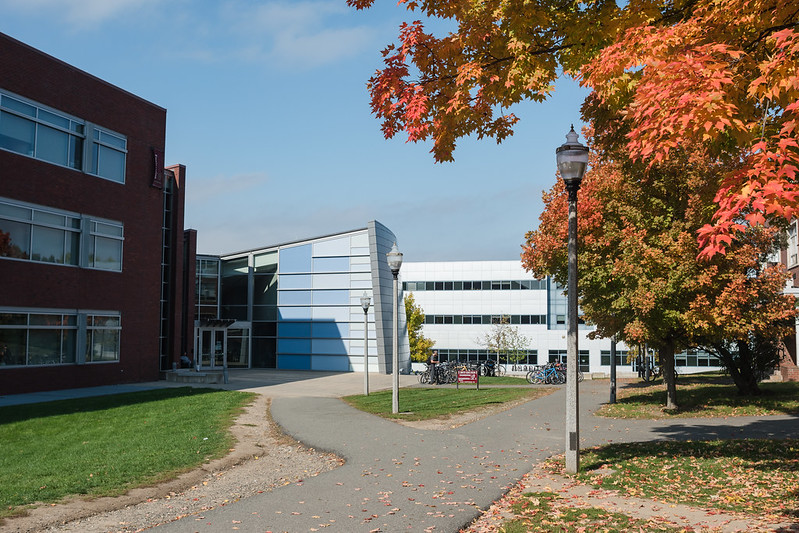During any regular semester, many students work at a job while also taking a number of classes. However, the new educational environment and financial circumstances caused by the COVID-19 pandemic have made working while also being enrolled in online classes full-time a reality for many college students.
Stephanie Stephens, a junior microbiology and public health major, as well as the president of the First-Generation Low-Income Partnership (FLIP) at the University of Massachusetts, is enrolled in seven classes and works five days a week, for up to eight hours per shift. On days when she isn’t working at her job, she helps out at the Center for Women and Community to speak to those that call to the center for assistance.
She considers her current situation to be “Plan B.” Originally, Stephens had planned to work as a Resident Assistant and security staff member at UMass. When schools abruptly transitioned to online to ease the spread of COVID-19 last semester, she had trouble finding another job as many stores were closed due to the lockdown. Eventually, she found one at her local CVS, where she currently works.
Although Stephens expressed that managing her schedule is far from easy, working is something that is financially necessary for her.
“I do it to support my family and I do it to pay my school fees,” she said.
College students are not unfamiliar to financial stress. According to a survey that the University conducted in 2015, 72 percent of undergraduates claimed that they experienced “financial stress ‘often’ or ‘sometimes’ during the academic year.”
However, the financial difficulties that have come with the COVID-19 pandemic has exacerbated these issues and changed the lives of many students and what a typical day looks like for them.
Mae Rose Whaley is a sophomore social thought and political economy major who is enrolled in six classes while also working 12-20 hours at her retail job. She explains that she was able to go through her freshman year without having to worry about having a job. However, both of her parents are self-employed and have had difficulty conducting their jobs lately due to the pandemic.
“My relationship to work has changed substantially,” Whaley said. “Before, it was definitely helpful that I paid some of my own bills, but it wouldn’t have been impossible for my mom to pay them on her own. Now, with both my parents barely working and COVID relief having been suspended, me working has become much more of a financial necessity.”
This situation is especially common among low income students, a group that is often underrepresented even in higher education. UMass, despite being a public institution, is predominately made of middle and upper class students, with about 46 percent coming from the top 20 percent, with the median income of student’s families being $102,900, according to study done in 2017.
The Center for Student Success Research at UMass conducts research on different aspects of postsecondary access and success, and how various things like low socioeconomic status can affect a student’s ability to succeed in college.
Ryan Wells, associate professor of higher education and the director of the Center for Student Success Research focuses on aspects of inequality in getting in and succeeding in college, and the trajectories for marginalized and underrepresented groups, including low-income students, students with disabilities and rural students.
He stresses that the problems that low-income students face in higher education has been a reality long before COVID-19 had happened, especially as the “power of financial aid” has gone down over the last few decades.
“These issues have existed for a very long time…there is a growing amount of unmet needs… but the pandemic has amplified and exacerbated, or kind of revealed all these things that were already happening and just made them even worse” said Wells.
He also said that although online classes can actually be beneficial for some students who are struggling financially, as it can reduce the cost of residence and commuting, moving online has exacerbated already existing inequalities overall.
“There is an argument to be made that it could actually be beneficial for students who are of low socioeconomic status…but the education system overall and higher education in particular…despite people’s best intentions sometimes is always designed for the more advantage students,” Wells said.
“It’s not as though faculty are not trying…but there is no question that overall…the advantaged will be able to take more advantage of the online system in ways to benefit them than people who are facing different societal and structural challenges,” he added.
Wells also emphasized the consequences that working long hours can have on students, which include lessening student engagement, less time available to spend on course work, lengthening time to a degree and consequently increasing the cost of a degree.
“Students working while in college is not necessarily a bad thing, but there is a pretty clear body of research that shows that there’s a point where it becomes a bad thing” said Wells.
The transition to online school has presented new challenges to the already hectic lives for working students. Many express the difficulties of balancing online classes and schoolwork with their job, and the mental and physical exhaustion that comes along with it.
“I feel as if I am receiving more work than necessary for some classes and although I know I am caught up on my work, I mentally and sometimes physically feel like I’m behind” said Randy Le, a sophomore biochemistry and public health major and the secretary of FLIP.
“Going to work while doing classes on an entire online platform is a new adjustment to everyone, not just me,” Le said. “There are times where I may not be aware of how I’m doing physically and mentally and I might dismiss signs of exhaustion because I feel a lot of pressure on my shoulders.”
“I have to be careful to not neglect myself during this hard transition,” he added. Le works as a nursing assistant for 16-24 hours a week while also being enrolled in seven classes.
“This is my first time working part time while taking classes as a college student, and these past two weeks have absolutely kicked my ass,” Whaley said. “My job is far from the hardest, but I have to juggle many different things while being treated poorly by a significant portion of our customers, so it does take a toll, both physically and mentally. I usually finish a day of work feeling drained, which makes doing homework to the best of my ability pretty challenging.”
Students who have become accustomed to having such packed schedules shared their strategies for balancing their workload and being more efficient.
Stephens explains that what keeps her afloat is “Determination and schedule…I have to plan every moment of my day… keep improving and find something that works for you.”
She also said that it has been helpful to “give myself a window to procrastinate” and “sleeping early and waking up early helps me so much. During the day I can get stuff out of the way.”
Although they have developed their own coping methods, students expressed ways in which their professors and the University could also alleviate some of their difficulties. With low-income students being the minority, students have voiced their concern over how online learning environment is designed to accommodate upper-class students, who don’t need to work a full-time job.
Le wished that “professors who are doing asynchronous lessons would do more synchronous ones…being in front of a professor, whether in class or online, enables us to learn more and gives us time to ask questions that others may have.”
Stephens, on the other hand, believes that asynchronous classes that can be done be around a student’s individual schedule and on their time would more helpful.
On a larger scale, the students emphasized the importance of recognition, understanding and communication between students and faculty in order to close the gap between students’ needs and the opportunities that the University presents to working students.
“It would be better if we had an advisor or a center for low-income and first-generation students…to talk your problems out because it helps you. You relieve some stress from doing that, and if you have that center that’s cater[ed] for you, I think people would find it easier to get resources in general,” said Stephens.
“Keeping an open line of communication and making it known to your students that they are allowed to falter, to struggle, to ask for help, is extremely important,” Whaley said. “From there, professors can work with their students to figure out which accommodations, if any, will be the most effective and helpful in a given scenario.”
“We all live complex and busy lives, we all have a lot to deal with, we all struggle emotionally in our own ways,” Whaley added. “School doesn’t work if professors don’t acknowledge that each and every student is coming from a different place and that their lives continue outside of the classroom.”
Wells said that he has seen administrators concerned about working students long before the pandemic.
“I know there are administrators thinking about this stuff, even before COVID they had been talking to me about how they can work with working students better,” he said.
According to Wells, the question in focus right now should be “How can we encourage the administration to take this group of students seriously, especially during this time, and try to find ways to serve them better?”
Saliha Bayrak is a Collegian Staff Writer and can be reached at [email protected].







